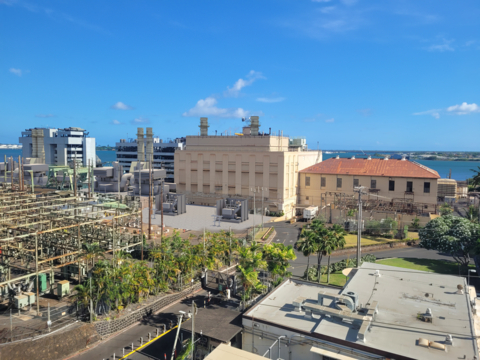Hawaiian Electric’s Waiau Repower Project Selected
- Selection of the proposal to replace aging generators reflects the company's commitment to transitioning to cleaner renewable fuels
- Significant cost savings expected over 30 years due to elimination of maintenance and repair costs for older units and increased efficiency of new units
- None.
Insights
Analyzing...
Efficient new technology will replace units built between 1947 and 1968

Rendering of proposed Waiau Repower project, subject to change, when all six new units are in service. Image courtesy of Hawaiian Electric.
The 253-megawatt project was one of several selected as part of a competitive procurement process for firm renewable generation on Oʻahu. This firm renewable generation resource will be available 24/7, is flexible to meet the needs of a modern grid using solar and wind and can run on renewable biofuels. The proposed repowering of the Waiau facility will be the largest generation project in Hawaiian Electric’s 132-year history.
“Our obligation is to reliably serve Oʻahu customers for the coming decades while also transitioning to cleaner renewable fuels and this is a unique, cost-effective opportunity to upgrade existing infrastructure with minimal impact to the community,” said Michael DeCaprio, Hawaiian Electric’s vice president of power supply.
The project still requires final approval by the PUC. Details on the price of the project and estimated cost to customers will be made available when the company files its application for approval. Because maintenance and repair costs for the older units will be eliminated, and because the new units are more efficient and will run less frequently, significant savings are expected over 30 years compared to the cost of continuing to run and repair the aging units.
The six new units are combustion turbines or CTs, which are similar to jet engines that turn turbines at high speeds to generate electricity. They are intended to support generation resources, including variable renewable energy like wind, solar and battery storage, when they are unavailable or unable to meet system demand. At approximately 42 megawatts, each CT unit is smaller and more efficient than the oil-fired steam boiler it will replace, and each can respond quickly to fluctuations on the electric grid. Initially, the CTs will use biodiesel and can potentially use renewable gas or hydrogen when it becomes commercially available.
Waiau Units 3 and 4, aged 76 and 73 years respectively and scheduled to be retired in 2024, will be the first units to be replaced with the new technology over the next several years with an expected in-service date of 2029.
The other four units, which came into service between 1959 and 1968, will be replaced in phases with all units expected to be online by 2033.
To learn more, visit hawaiianelectric.com/waiaurepower.
View source version on businesswire.com: https://www.businesswire.com/news/home/20231211827739/en/
Source: Hawaiian Electric Industries, Inc.







